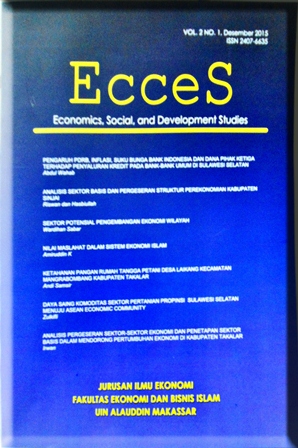Analisis Pergeseran Sektor-Sektor Ekonomi dan Penetapan Sektor Basis Dalam Mendorong Pertumbuhan Ekonomi di Kabupaten Takalar.
Abstrak
This study used data collection: a) Field Research i.e. research conducted directly by a visit to the object of research, namely the Office of the Central Bureau of Statistics and the Office of the regional planning agency in Takalar, South Sulawesi Province, and at the same time observe by the field employees. b) Research Library This method is carried out to obtain (refrence) by reading a variety of literature literature are closely related to the discussion of this study in order to obtain a theoretical basis used. The purpose of this research is to determine whether there has been a shift in the economic sector in the district Takalar from 2009 to 2013. In order to determine whether it is with a shift in the economic sector and the establishment of a base sector can boost economic growth in Takalar from the year 2009 until the year 2013. From the results of the study during the period from 2009 to 2013 regional gross domestic product (GDP) Takalar Regency experiencing absolute value or increase the area's economic performance Rp. 93,81 billion. It can be seen from the total value of Dij are positive on any economic activity. The increase in economic performance Takalar regency contributed by all sectors of the economy which exist in the GDP. And a shift occurs from the agricultural sector to the services sector. The agricultural sector in Takalar, still the biggest sector of production value and so does the value of its contribution to the regional gross domestic product (GDP) with an average contribution per year during the period from 2009 to the year 2013 in the amount of 48.50%, followed by the services sector with an average level of contribution that is equal to 44.13% and the industrial sector amounted to 8.09% and then the mining sector that is equal to 0.68% per year. Based on the analysis quotien location (LQ) there are four economic sectors that can be used as a base sectors namely agriculture, electricity, gas and water supply, Building and Other services in which all the four sectors have an LQ> 1##plugins.generic.usageStats.downloads##
Referensi
Ambar, Tadang. 1989, Ekonomi Pembangunan. Bina Ilmu: Surabaya.
Boediono. 1992. Teori Pertumbuhan Ekonomi. BPFE: Yogyakarta.
Bengolo, M.T. 1995. Tenaga Kerja dan Pembangunan, Jasa Karya: Jakarta
Basri, Faisal. 1995. Perekonomian Indonesia Menjelang Abad XXI. Erlangga: Jakarta
Djojohadikusumo, Sumitro. 1997. Ekonomi Pembangunan. Gramedia: Jakarta.
Irawan dan Suparmoko. 1990. Ekonomika Pembangunan Edisi 5. BPFE UGM: Yogyakarta.
Jingan, M.L. 1992. Ekonomi Pembagunan dan Perencanaan. Rajawali Press: Jakarta
Kodhyat H. 1996. Sejarah Pariwisata dan Perkembangannya di Indonesia. Grafindo: Jakarta.
Pendit, Nyoman S. 1999. Ilmu Pariwisata Sebuah Pengantar Perdana. PT. Radnya Paramita: Jakarta.
Radiawan, dkk. 1997/1998. Pengembangan Ekonomi. Tarsito:
Sukirno, Sadono. 1994. Pengantar Ekonomi Mikro. Radja Grafindo Persada: Jakarta.
Sudarsono. 1982. Ekonomi Pembangunan. LP3ES: Yogyakarta.
Simanjuntak J, Payaman. 1990, Pengantar Sumber Daya Manusia, Fakultas Ekonomi UI: Jakarta.
Tjoy, Tallasa. 1991, Peranan Sektor Informal Dalam Penyerapan Tenaga Kerja. PP3ES: Jakarta
Widodo, Tri. 2006. Perencanaan Pembangunan Era Otonomi Daerah. UPP STIM YKPN: Yogyakarta.

